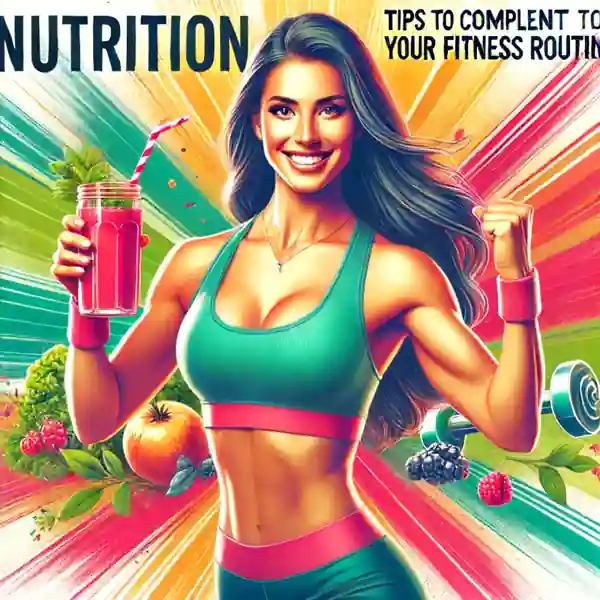Are you putting in hours at the gym but not seeing the results you want? The secret might not lie in your workout routine but in your nutrition. Proper nutrition is just as important as your exercise regimen when it comes to achieving your fitness goals. The right diet can fuel your workouts, speed up recovery, and help you build muscle and lose fat more effectively.we will delve into essential nutrition tips to complement your fitness routine.
Brief Overview of the Importance of Nutrition in Fitness
Nutrition and fitness are two sides of the same coin. While regular exercise is essential for building strength, endurance, and overall health, proper nutrition is the foundation that supports these efforts. Without the right nutrients, your body can’t perform at its best or recover efficiently. According to the American College of Sports Medicine, athletes and fitness enthusiasts who prioritize nutrition see significant improvements in performance, recovery, and overall well-being.
Explanation of How Proper Nutrition Can Enhance Workout Results
Proper nutrition can make a dramatic difference in your workout results. Here’s how:
- Fueling Your Workouts:
- Your body needs energy to perform, and that energy comes from the food you eat. Carbohydrates are especially important as they provide the primary fuel for your muscles during high-intensity workouts. Consuming complex carbs like whole grains, fruits, and vegetables can ensure you have the energy to power through your exercise routines.
- Speeding Up Recovery:
- After a tough workout, your muscles need to repair and rebuild. Consuming a combination of protein and carbohydrates post-exercise can help with this process. Research suggests that ingesting 20-30 grams of protein shortly after working out can optimize muscle recovery and growth.
- Building Muscle and Losing Fat:
- Protein isn’t just for bodybuilders. It’s crucial for anyone looking to build muscle and lose fat. The American Dietetic Association recommends that active individuals consume 1.2 to 2.0 grams of protein per kilogram of body weight daily to support muscle repair and growth. Meanwhile, a diet rich in healthy fats and low in refined sugars can help decrease body fat percentage.
- Enhancing Overall Health:
- A well-rounded diet that includes a variety of vitamins and minerals is vital for maintaining overall health. Nutrients like iron, calcium, and vitamin D play key roles in muscle function, bone health, and immune support, all of which are crucial for anyone leading an active lifestyle.
Introduction of the Main Points to Be Covered in the Blog Post
In this blog post, we will delve into essential nutrition tips to complement your fitness routine. We’ll cover:
- Healthy Eating Habits: Discover what to eat and when to eat to fuel your workouts and aid recovery.
- Diet Plans for Fitness Goals: Explore tailored diet plans that align with your specific fitness objectives, whether it’s building muscle, losing weight, or improving endurance.
- Nutritional Advice for Gym-Goers: Learn about the best foods to eat before and after workouts to maximize performance and recovery.
- Top Supplements for Workout Recovery: Get insights into supplements that can enhance recovery and support your fitness journey.
- Meal Planning for an Active Lifestyle: Find out how to plan your meals effectively to ensure you get the necessary nutrients to support your active lifestyle.
- Fitness Nutrition Guide for Beginners: A comprehensive guide for those new to fitness, offering simple yet effective nutrition tips to kickstart your journey.
Table of Contents
Understanding the Basics of Nutrition

Proper nutrition is the cornerstone of any successful fitness routine. It fuels your body, supports recovery, and maximizes the benefits of your workouts. To truly harness the power of your fitness regimen, you must understand the basics of nutrition. Here, we’ll explore macronutrients, micronutrients, and the crucial role of hydration.
Explanation of Macronutrients (Carbohydrates, Proteins, Fats)
Macronutrients are the primary nutrients your body needs in large amounts to function optimally. They include carbohydrates, proteins, and fats.
- Carbohydrates: Often termed as the body’s primary energy source, carbohydrates are essential for fueling your workouts. They are broken down into glucose, which provides the necessary energy for muscle contractions. Complex carbs like whole grains, fruits, and vegetables are ideal as they offer sustained energy. According to the Dietary Guidelines for Americans, carbohydrates should make up 45-65% of your total daily calories.
- Proteins: These are the building blocks of muscle. Adequate protein intake is vital for muscle repair and growth, especially after intense workouts. Sources include lean meats, fish, dairy, legumes, and plant-based proteins like tofu and quinoa. The recommended daily intake is 0.8 grams of protein per kilogram of body weight, but those engaging in regular strength training may need 1.2 to 2.0 grams per kilogram.
- Fats: Despite their bad reputation, fats are essential for hormone production, energy storage, and nutrient absorption. Healthy fats, such as those found in avocados, nuts, seeds, and olive oil, should constitute about 20-35% of your daily calories. Avoid trans fats and limit saturated fats to less than 10% of your daily intake.
Importance of Micronutrients (Vitamins and Minerals)
While macronutrients provide the bulk of energy and structural components, micronutrients are equally critical. These include vitamins and minerals, which are required in smaller amounts but are vital for numerous bodily functions.
- Vitamins: Each vitamin plays a unique role in your body. For example, Vitamin D is crucial for bone health and immune function, while Vitamin B12 supports energy production and neurological function. Incorporate a variety of fruits, vegetables, and fortified foods to meet your vitamin needs.
- Minerals: Important minerals like calcium, iron, and potassium support bone health, oxygen transport, and muscle function. Calcium is found in dairy products and leafy greens, while iron is abundant in red meat and legumes. Potassium, necessary for heart and muscle function, is abundant in bananas, potatoes, and spinach.
According to the World Health Organization, deficiencies in micronutrients can lead to significant health issues, emphasizing the importance of a balanced diet.
The Role of Hydration in Fitness
Hydration is often overlooked but is a critical aspect of nutrition that complements your fitness routine. Water makes up about 60% of your body weight and is involved in nearly every bodily function, including temperature regulation, joint lubrication, and nutrient transport.
- Daily Water Intake: The National Academies of Sciences, Engineering, and Medicine recommends a daily water intake of about 3.7 liters for men and 2.7 liters for women, though this can vary based on activity level, climate, and individual needs.
- Hydration During Exercise: It’s essential to stay hydrated before, during, and after workouts. Dehydration can lead to decreased performance, muscle cramps, and fatigue. Aim to drink 17-20 ounces of water 2-3 hours before exercise, and 7-10 ounces every 10-20 minutes during exercise. Post-workout, rehydrate with 16-24 ounces of water for every pound of body weight lost through sweat.
Pre-Workout Nutrition

When it comes to optimizing your fitness routine, pre-workout nutrition plays a pivotal role. Eating the right foods before exercising can significantly impact your performance, endurance, and recovery. Here, we’ll discuss the importance of pre-workout meals, the best foods to eat before a workout, timing your pre-workout meal for optimal performance, and provide an example of a balanced pre-workout meal.Healthline: Fitness Nutrition
Importance of Pre-Workout Meals
Pre-workout meals are crucial because they provide the energy needed for your muscles to perform at their best. The food you consume before exercising helps to:
- Fuel your body: Carbohydrates provide the quick energy needed for high-intensity workouts, while proteins and fats offer sustained energy for longer sessions.
- Improve performance: A well-balanced pre-workout meal can enhance strength, endurance, and overall performance, allowing you to push harder and achieve better results.
- Prevent muscle breakdown: Consuming protein before a workout helps to reduce muscle protein breakdown, promoting muscle repair and growth.
- Maintain blood sugar levels: Eating before exercising helps to stabilize blood sugar levels, preventing fatigue and dizziness during your workout.
Best Foods to Eat Before a Workout
Choosing the right foods is essential to ensure you get the most out of your workout. Here are some of the best foods to eat before a workout:
- Bananas: Often referred to as nature’s power bar, bananas are rich in carbohydrates and potassium, which help support nerve and muscle function.
- Oats: A great source of slow-releasing carbohydrates, oats provide sustained energy. They also contain fiber, which helps to keep you full.
- Greek Yogurt with Berries: Greek yogurt is high in protein, and berries add a dose of quick-digesting carbs and antioxidants.
- Whole Grain Bread with Peanut Butter: This combination offers a balance of carbs, healthy fats, and protein.
- Smoothies: A blend of fruits, vegetables, and a protein source like whey or plant-based protein powder can be easily digested and provide quick energy.
Timing Your Pre-Workout Meal for Optimal Performance
The timing of your pre-workout meal is just as important as the meal itself. Eating too close to your workout can cause discomfort, while eating too early can leave you feeling hungry. Here are some guidelines:
- 2-3 Hours Before Workout: Eat a balanced meal containing protein, carbohydrates, and fats. For example, chicken with brown rice and vegetables.
- 30-60 Minutes Before Workout: Opt for a small, easily digestible snack. For example, a banana or a smoothie.
Example of a Balanced Pre-Workout Meal
To give you a clear idea, here’s an example of a balanced pre-workout meal that you can have about 2-3 hours before exercising:
- Grilled Chicken Breast: Provides lean protein to support muscle repair and growth.
- Quinoa or Brown Rice: Offers complex carbohydrates for sustained energy.
- Steamed Broccoli and Carrots: Packed with vitamins and minerals to support overall health.
- Half an Avocado: Adds healthy fats to keep you satiated and provide a steady energy source.
Nutritional Breakdown:
- Calories: Approximately 400-500
- Protein: 30-35 grams
- Carbohydrates: 40-50 grams
- Fats: 10-15 grams
Post-Workout Nutrition

Ensuring proper post-workout nutrition is essential for recovery, muscle growth, and overall fitness improvement. The right post-exercise meal helps your body repair tissues, replenish energy stores, and reduce muscle soreness. Here, we will explore the significance of post-workout recovery nutrition, identify the best foods to eat after a workout, discuss the timing of your post-workout meal for optimal recovery, and provide an example of a balanced post-workout meal.
Significance of Post-Workout Recovery Nutrition
The period immediately following your workout is often referred to as the “anabolic window”, a crucial time when your body is most receptive to nutrients. Consuming the right nutrients during this window can significantly impact your recovery and performance. Here’s why post-workout nutrition is vital:
- Muscle Repair and Growth: After a workout, your muscles are in a state of breakdown. Consuming protein helps to repair and build new muscle fibers, promoting muscle growth.
- Glycogen Replenishment: Exercise, especially high-intensity workouts, depletes your glycogen stores. Carbohydrates are necessary to replenish these stores and ensure you have the energy for your next workout.
- Reduced Muscle Soreness: Proper post-workout nutrition can help reduce muscle soreness and inflammation, allowing for quicker recovery and less downtime between workouts.
- Improved Immune Function: Intense exercise can temporarily suppress your immune system. Consuming the right nutrients can help boost your immune function and keep you healthy.
Best Foods to Eat After a Workout
Selecting the right foods to eat after a workout is crucial for maximizing recovery and performance. Here are some of the best foods to eat after a workout:
- Lean Proteins: Chicken breast, turkey, lean beef, eggs, and plant-based proteins like tofu and lentils provide essential amino acids for muscle repair.
- Complex Carbohydrates: Sweet potatoes, quinoa, brown rice, whole grain pasta, and oatmeal help replenish glycogen stores.
- Healthy Fats: Avocados, nuts, seeds, and olive oil support overall recovery and reduce inflammation.
- Hydrating Fluids: Water, coconut water, and electrolyte-rich drinks help restore fluids lost through sweat and maintain hydration.
Timing Your Post-Workout Meal for Optimal Recovery
Timing is a crucial aspect of post-workout nutrition. To maximize recovery, it’s recommended to consume your post-workout meal within 30 minutes to 2 hours after exercising. During this period, your muscles are more sensitive to nutrients, making it the ideal time to refuel. Here’s a simple guideline:
- Immediately After Workout: If you can’t have a full meal immediately, opt for a protein shake or a quick snack like a banana with almond butter.
- Within 30 Minutes: Aim for a small, balanced meal with protein and carbs to kickstart recovery.
- Within 2 Hours: Have a complete, nutrient-dense meal that includes lean protein, complex carbs, and healthy fats.
Example of a Balanced Post-Workout Meal
To give you a practical idea, here’s an example of a balanced post-workout meal:
- Grilled Salmon: Rich in high-quality protein and omega-3 fatty acids, which reduce inflammation and promote muscle repair.
- Quinoa Salad: Provides complex carbohydrates to replenish glycogen stores and fiber for sustained energy.
- Steamed Broccoli and Carrots: Packed with vitamins, minerals, and antioxidants to support overall health and recovery.
- Mixed Berries: Berries like blueberries and strawberries are high in antioxidants, which help reduce muscle soreness and oxidative stress.
Nutritional Breakdown:
- Calories: Approximately 500-600
- Protein: 30-40 grams
- Carbohydrates: 50-60 grams
- Fats: 15-20 grams
Meal Planning and Preparation

Effective meal planning and preparation is a cornerstone of maintaining a healthy diet and maximizing your fitness results. Not only does it save time and reduce stress, but it also ensures that you’re consistently eating balanced meals that support your fitness goals. In this section, we’ll explore the benefits of meal planning and preparation, provide tips for creating a weekly meal plan, discuss how to prep meals efficiently, and offer a sample meal plan for a week.
Benefits of Meal Planning and Preparation
Meal planning and preparation offer numerous advantages that can significantly enhance your fitness routine:
- Time-Saving: By dedicating a specific time to plan and prepare your meals, you save valuable time during the week that would otherwise be spent cooking or deciding what to eat.
- Nutritional Consistency: Planning your meals ensures you’re getting a balanced intake of macronutrients (carbohydrates, proteins, fats) and micronutrients (vitamins, minerals) essential for your fitness goals.
- Cost-Effective: Preparing meals in advance helps reduce food waste and saves money, as you can buy ingredients in bulk and avoid last-minute, expensive takeout options.
- Portion Control: Prepping meals allows you to control portion sizes, preventing overeating and helping you stay on track with your fitness objectives.
- Stress Reduction: Knowing that your meals are planned and ready reduces the stress of daily meal decisions, allowing you to focus more on your workouts and recovery.
Tips for Creating a Weekly Meal Plan
Creating an effective weekly meal plan involves a few key steps:
- Assess Your Schedule: Look at your week ahead and identify any days when you might have less time to cook or need portable meals.
- Set Your Goals: Determine your nutritional needs based on your fitness goals. Are you aiming to build muscle, lose weight, or maintain your current fitness level?
- Choose Your Recipes: Select recipes that fit your goals, preferences, and schedule. Aim for a variety of meals to ensure a balanced intake of nutrients.
- Make a Shopping List: Write down all the ingredients you’ll need for your chosen recipes, grouped by category (e.g., vegetables, proteins, grains).
- Prep in Batches: Dedicate a few hours once or twice a week to cook and prepare your meals. Batch cooking can include making large portions of grains, proteins, and vegetables that can be mixed and matched throughout the week.
How to Prep Meals Efficiently
Efficient meal preparation can make your weekly meal plan more manageable and sustainable:
- Invest in Quality Containers: Use airtight, microwave-safe containers to store your meals. Glass containers are durable and do not absorb odors or stains.
- Use Kitchen Gadgets: Utilize gadgets like slow cookers, rice cookers, and food processors to save time and effort.
- Cook in Bulk: Prepare large batches of staple items like brown rice, quinoa, roasted vegetables, and grilled chicken. These can be used in various recipes throughout the week.
- Prep Ingredients: Chop vegetables, marinate proteins, and portion out snacks in advance. This makes it easier to assemble meals quickly.
- Label and Organize: Label your containers with the contents and date. Organize your fridge and pantry to keep the most perishable items at the front.
Sample Meal Plan for a Week
Here’s a sample meal plan for a week to get you started, with meals designed to complement your fitness routine:
Monday:
- Breakfast: Greek yogurt with honey and mixed berries
- Lunch: Quinoa salad with chickpeas, cucumbers, and feta cheese
- Dinner: Grilled salmon with steamed broccoli and sweet potatoes
- Snack: Apple slices with almond butter
Tuesday:
- Breakfast: Oatmeal with banana slices and chia seeds
- Lunch: Turkey and avocado wrap with whole grain tortilla
- Dinner: Chicken stir-fry with mixed vegetables and brown rice
- Snack: Carrot sticks with hummus
Wednesday:
- Breakfast: Smoothie with spinach, mango, protein powder, and almond milk
- Lunch: Lentil soup with a side of mixed greens salad
- Dinner: Baked tilapia with quinoa and roasted Brussels sprouts
- Snack: Greek yogurt with a handful of nuts
Thursday:
- Breakfast: Scrambled eggs with spinach and whole grain toast
- Lunch: Chicken Caesar salad with a light dressing
- Dinner: Beef and vegetable stew with brown rice
- Snack: Orange slices and a handful of almonds
Friday:
- Breakfast: Whole grain toast with avocado and a poached egg
- Lunch: Tofu and vegetable stir-fry with quinoa
- Dinner: Shrimp tacos with cabbage slaw and a side of black beans
- Snack: Cottage cheese with pineapple chunks
Saturday:
- Breakfast: Smoothie bowl with mixed berries, granola, and chia seeds
- Lunch: Grilled chicken salad with mixed greens, cherry tomatoes, and balsamic vinaigrette
- Dinner: Spaghetti with marinara sauce and turkey meatballs
- Snack: Celery sticks with peanut butter
Sunday:
- Breakfast: Pancakes made with whole wheat flour, topped with fresh fruit
- Lunch: Tuna salad with mixed greens and whole grain crackers
- Dinner: Vegetable curry with brown rice
- Snack: Mixed berry smoothie
Supplements to Complement Your Fitness Routine

Incorporating the right supplements to complement your fitness routine can significantly enhance your performance, recovery, and overall results. However, with so many options available, it can be challenging to know which supplements are worth your investment. This section will provide an overview of popular fitness supplements such as protein powders, BCAAs, and creatine, explain when and how to use supplements effectively, and discuss the potential benefits and risks of supplements.Mayo Clinic – Nutrition and Healthy Eating
Overview of Popular Fitness Supplements
- Protein Powders: Protein is essential for muscle repair and growth. Protein powders, such as whey, casein, and plant-based options, provide a convenient way to increase your protein intake. Whey protein is a fast-digesting protein ideal for post-workout recovery, while casein protein digests slowly, making it suitable for nighttime use. Plant-based proteins like pea and soy are excellent alternatives for those with dietary restrictions.
- Branched-Chain Amino Acids (BCAAs): BCAAs (leucine, isoleucine, and valine) are essential amino acids that play a critical role in muscle protein synthesis. They help reduce muscle soreness and fatigue, making them popular among athletes. Studies have shown that BCAA supplementation can decrease exercise-induced muscle damage by 33%.
- Creatine: One of the most researched supplements, creatine enhances strength, power, and muscle mass. It works by increasing the availability of ATP (adenosine triphosphate), the primary energy carrier in cells. Regular creatine supplementation can lead to an average increase in strength gains of 5-15%.
- Beta-Alanine: This amino acid helps buffer acid in muscles, reducing fatigue and improving performance during high-intensity exercise. Supplementing with beta-alanine can increase muscular endurance by 2-3% over time.
- Omega-3 Fatty Acids: Known for their anti-inflammatory properties, omega-3s support joint health, reduce muscle soreness, and enhance heart health. They are found in fish oil supplements and can significantly benefit overall fitness and recovery.
When and How to Use Supplements Effectively
Timing and dosage are crucial factors in maximizing the benefits of supplements. Here’s a guide on when and how to use these popular supplements:
- Protein Powders: Consume 20-30 grams of protein within 30 minutes post-workout to support muscle recovery. For casein protein, take a serving before bed to fuel muscle repair overnight.
- BCAAs: Take 5-10 grams of BCAAs before, during, or after your workout to reduce muscle soreness and improve recovery. They are especially beneficial during long or intense training sessions.
- Creatine: Start with a loading phase of 20 grams per day (split into four doses) for 5-7 days, followed by a maintenance dose of 3-5 grams per day. Take creatine with a meal or a post-workout shake for optimal absorption.
- Beta-Alanine: Supplement with 2-5 grams per day, split into smaller doses to minimize tingling sensations. Consistent daily intake is essential to see performance improvements.
- Omega-3 Fatty Acids: Aim for 1-2 grams of EPA and DHA (the active components of omega-3s) per day. Fish oil supplements can be taken with meals to enhance absorption and reduce the risk of fishy aftertaste.
Potential Benefits and Risks of Supplements
Supplements can offer significant benefits but also come with potential risks if not used correctly. Understanding both sides will help you make informed decisions:
Benefits:
- Enhanced Performance: Supplements like creatine and beta-alanine can improve strength, power, and endurance.
- Faster Recovery: Protein powders and BCAAs support muscle repair and reduce soreness, helping you bounce back quicker from workouts.
- Convenience: Supplements provide an easy way to meet your nutritional needs, especially for busy individuals or those with dietary restrictions.
- Specific Health Benefits: Omega-3s support heart health, reduce inflammation, and improve joint function, benefiting overall fitness.
Risks:
- Overconsumption: Taking too much of certain supplements, such as protein, can strain your kidneys and liver. Stick to recommended doses to avoid adverse effects.
- Quality Concerns: Not all supplements are created equal. Look for products that have been third-party tested for purity and potency to ensure you’re getting a safe and effective product.
- Side Effects: Some supplements, like beta-alanine, can cause tingling sensations or gastrointestinal discomfort. Start with smaller doses to assess your tolerance.
Nutrition Tips and Strategies

Proper nutrition is essential for achieving any fitness goal, whether it’s muscle gain, fat loss, or endurance training. Tailoring your diet to match your specific objectives can significantly enhance your results and overall health. In this section, we’ll explore nutrition strategies for muscle gain, nutrition strategies for fat loss, nutrition strategies for endurance training, and how to tailor your diet to your specific fitness goals.
Nutrition Strategies for Muscle Gain
Building muscle requires a combination of strength training and a diet rich in nutrients that support muscle growth and repair. Here are key nutrition tips to complement your fitness routine focused on muscle gain:
- Increase Caloric Intake: To build muscle, you need to consume more calories than you burn. Aim for a caloric surplus of 250-500 calories per day.
- Prioritize Protein: Protein is the building block of muscle. Aim for 1.6 to 2.2 grams of protein per kilogram of body weight daily. Good sources include lean meats, fish, eggs, dairy, legumes, and protein supplements.
- Healthy Carbohydrates: Carbs provide the energy needed for intense workouts. Include complex carbohydrates like brown rice, quinoa, oats, and sweet potatoes in your diet.
- Healthy Fats: Fats support hormone production, including those involved in muscle growth. Include sources like avocados, nuts, seeds, and olive oil.
- Frequent Meals: Eating every 3-4 hours ensures a steady supply of nutrients to your muscles. Include a mix of proteins, carbs, and fats in each meal.
Nutrition Strategies for Fat Loss
Losing fat while maintaining muscle requires a strategic approach to nutrition. Here are effective nutrition tips to complement your fitness routine aimed at fat loss:
- Caloric Deficit: To lose fat, consume fewer calories than you burn. Aim for a caloric deficit of 500-750 calories per day for a safe weight loss of 1-2 pounds per week.
- High Protein Intake: Protein helps maintain muscle mass during weight loss. Aim for 2.2 to 2.6 grams of protein per kilogram of body weight daily.
- Low-Glycemic Carbs: Focus on carbohydrates with a low glycemic index, such as whole grains, vegetables, and legumes, to stabilize blood sugar levels and reduce cravings.
- Healthy Fats: Include moderate amounts of healthy fats to keep you full and support overall health. Avocados, nuts, and olive oil are excellent choices.
- Hydration: Drinking plenty of water helps with metabolism and reduces hunger. Aim for at least 8 cups of water per day.
Nutrition Strategies for Endurance Training
Endurance athletes need a diet that supports prolonged physical activity. Here are specialized nutrition tips to complement your fitness routine for endurance training:
- High Carbohydrate Intake: Carbs are the primary fuel source for endurance activities. Aim for 6-10 grams of carbohydrates per kilogram of body weight daily, focusing on complex carbs.
- Moderate Protein Intake: Protein is essential for muscle repair and recovery. Aim for 1.2 to 1.4 grams of protein per kilogram of body weight daily.
- Healthy Fats: Fats provide a secondary source of energy during long-duration activities. Include healthy fats like nuts, seeds, and fatty fish in your diet.
- Electrolytes: Maintaining electrolyte balance is crucial during endurance training. Consume foods rich in potassium, magnesium, and sodium, and consider electrolyte drinks during long sessions.
- Hydration: Endurance athletes need to stay well-hydrated. Drink water consistently throughout the day and increase intake during and after training sessions.
Tailoring Your Diet to Your Specific Fitness Goals
To achieve your specific fitness goals, it’s essential to tailor your diet accordingly. Here’s how to adjust your nutrition plan based on your objectives:
- Assess Your Goals: Determine whether your primary goal is muscle gain, fat loss, or endurance. Each goal requires a different approach to caloric intake, macronutrient distribution, and meal timing.
- Adjust Macronutrients: Based on your goals, adjust the ratios of proteins, carbohydrates, and fats in your diet. For example, muscle gain requires higher protein and calorie intake, while fat loss requires a caloric deficit and high protein.
- Monitor and Adjust: Keep track of your progress and adjust your diet as needed. If you’re not seeing the desired results, re-evaluate your caloric intake and macronutrient distribution.
- Stay Consistent: Consistency is key to achieving any fitness goal. Stick to your nutrition plan, but also allow for occasional flexibility to maintain a healthy relationship with food.
Common Nutrition Myths Debunked

In the world of fitness, there are many nutrition tips to complement your fitness routine that are often clouded by misconceptions. These myths can lead to confusion and hinder progress. In this section, we’ll be addressing common misconceptions about fitness nutrition, providing evidence-based facts, and encouraging readers to make informed nutrition choices.
Addressing Common Misconceptions About Fitness Nutrition
- Myth: Carbs Are Bad for You
- Fact: Carbohydrates are essential for providing energy, especially for high-intensity workouts. Complex carbs like whole grains, fruits, and vegetables are vital for sustained energy and overall health.
- Evidence: Studies show that diets rich in whole grains are associated with a lower risk of chronic diseases and better weight management.
- Myth: You Need to Eat Protein Immediately After a Workout
- Fact: While protein is crucial for muscle recovery, the “anabolic window” extends beyond 30 minutes post-workout. Eating protein within 2 hours after exercise is still effective for muscle repair and growth.
- Evidence: Research indicates that overall daily protein intake is more important than precise timing for muscle synthesis.
- Myth: Fat-Free Foods Are Healthier
- Fact: Fats are essential for absorbing vitamins, hormone production, and providing energy. Fat-free foods often contain added sugars to enhance flavor, which can be detrimental to health.
- Evidence: Healthy fats from sources like avocados, nuts, and olive oil support heart health and should be included in a balanced diet.
- Myth: Supplements Can Replace Whole Foods
- Fact: Supplements are meant to complement, not replace, a balanced diet. Whole foods provide a range of nutrients that supplements cannot replicate.
- Evidence: The American Heart Association recommends getting nutrients from food rather than supplements for better health outcomes.
Providing Evidence-Based Facts
- Protein Requirements
- Fact: The recommended dietary allowance for protein is 0.8 grams per kilogram of body weight for the average adult. Athletes may need more, around 1.2 to 2.0 grams per kilogram, depending on their training intensity.
- Evidence: The International Society of Sports Nutrition suggests higher protein intake for athletes to support muscle repair and growth.
- Hydration Needs
- Fact: Proper hydration is critical for optimal performance and recovery. It’s recommended to drink at least 8 cups (2 liters) of water per day, more if you’re active.
- Evidence: The National Academies of Sciences, Engineering, and Medicine suggest that men need about 3.7 liters and women 2.7 liters of fluids per day, which includes water from all beverages and foods.
- Role of Micronutrients
- Fact: Vitamins and minerals are essential for various bodily functions, including energy production, immune support, and bone health.
- Evidence: Deficiencies in micronutrients like iron and calcium can impair athletic performance and increase the risk of injuries.
Encouraging Readers to Make Informed Nutrition Choices
- Read Nutrition Labels
- Tip: Understanding nutrition labels can help you make better food choices. Look for foods high in nutrients and low in added sugars, sodium, and unhealthy fats.
- Balance Your Plate
- Tip: Aim for a balanced plate that includes a variety of food groups. Half of your plate should be fruits and vegetables, one-quarter protein, and one-quarter whole grains.
- Consult Professionals
- Tip: For personalized nutrition advice, consult a registered dietitian or a nutritionist. They can provide tailored guidance based on your specific fitness goals and dietary needs.
- Stay Informed
- Tip: Keep up with current nutrition research and guidelines. Reliable sources include scientific journals, government health agencies, and professional organizations.
Real-Life Success Stories
Incorporating effective nutrition tips to complement your fitness routine can lead to incredible transformations. Below, we feature a few success stories of individuals who significantly improved their fitness with proper nutrition. These personal anecdotes and testimonials serve as motivation and encouragement for readers to share their own stories.
Success Story 1: Ajay’s Journey to Muscle Gain
Ajay, a 30-year-old software engineer from Delhi, struggled with gaining muscle despite consistent workouts. His turning point came when he revamped his nutrition plan.
Before:
- Challenge: Plateaued muscle growth despite rigorous training.
- Diet: Random, unplanned meals with insufficient protein.
After:
- Strategy: Ajay increased his protein intake to 1.8 grams per kilogram of body weight and ensured a caloric surplus of 300 calories per day.
- Results: Over six months, Ajay gained 10 pounds of lean muscle. His strength improved significantly, with his bench press increasing from 150 to 200 pounds.
Testimonial: “Focusing on my nutrition was a game-changer. The right balance of proteins, carbs, and fats helped me break through my plateau and achieve my muscle gain goals.” – Ajay
Success Story 2: Maya’s Path to Fat Loss
Maya, a 25-year-old teacher, struggled with losing weight due to a hectic schedule and poor eating habits.
Before:
- Challenge: Inconsistent meals and late-night snacking.
- Diet: High in processed foods and sugary snacks.
After:
- Strategy: Maya adopted a structured meal plan with a caloric deficit of 500 calories per day. She focused on whole foods, high-protein meals, and reduced sugar intake.
- Results: In nine months, Maya lost 30 pounds. She also reported increased energy levels and improved mood.
Testimonial: “Meal planning helped me stay on track even with my busy schedule. I feel more energetic and confident now.” – Maya
Success Story 3: Jaiky’s Endurance Transformation
Jaiky, a 40-year-old marketing executive from Lucknow, aimed to improve his endurance for long-distance running.
Before:
- Challenge: Hitting a wall during long runs and frequent fatigue.
- Diet: Inadequate carbohydrate intake and poor hydration.
After:
- Strategy: Jaiky increased his carbohydrate intake to 7 grams per kilogram of body weight and focused on hydration with electrolytes.
- Results: Within six months, Jaiky completed his first marathon, improving his running time by 20 minutes compared to previous half-marathons.
Conclusion
As we’ve explored, understanding and implementing the right nutrition tips to complement your fitness routine is crucial for achieving your health and fitness goals. Here’s a quick recap of the main points discussed in this blog post:
- Understanding the Basics of Nutrition:
- Macronutrients: Carbohydrates, proteins, and fats are essential for energy, muscle repair, and overall health.
- Micronutrients: Vitamins and minerals play critical roles in bodily functions and athletic performance.
- Hydration: Proper hydration is vital for performance and recovery.
- Pre-Workout Nutrition:
- Importance of fueling your body before exercise.
- Best foods to eat before a workout and timing for optimal performance.
- Post-Workout Nutrition:
- Significance of recovery nutrition.
- Ideal foods and timing for post-workout meals to support muscle repair and replenishment.
- Meal Planning and Preparation:
- Benefits of planning and prepping meals to ensure consistency and convenience.
- Tips for efficient meal preparation and a sample weekly meal plan.
- Supplements to Complement Your Fitness Routine:
- Overview of popular supplements like protein powders, BCAAs, and creatine.
- Guidelines for effective use and understanding potential benefits and risks.
- Nutrition Tips for Different Fitness Goals:
- Tailored nutrition strategies for muscle gain, fat loss, and endurance training.
- Adjusting your diet to align with your specific fitness objectives.
- Common Nutrition Myths Debunked:
- Addressing and correcting common misconceptions about fitness nutrition.
- Providing evidence-based facts to guide informed choices.
- Real-Life Success Stories:
- Inspiring anecdotes from individuals who improved their fitness with proper nutrition.
- Encouragement for readers to share their own experiences and insights.

